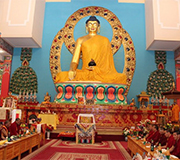One day, Buddha stuck a wooden toothpick into the ground, and a beautiful fruit tree instantly grew out of it. On the 15th lunar day, Buddha touched the earth with his hand and those living on Earth saw the suffering of beings in hell. According to legend, more than 100,000 people became faithful after that.
In the biography of the Buddha, compiled by Taranatha, it is said that the dispute "has gathered a myriad of people to see great miracles, as well as countless gods." For 15 days, the Buddha showed his abilities, performing miracles to prove the truth of the faith he preached. 91 thousand followers of false teachers went over to the side of the Buddha and accepted his teachings.
After the departure of the Buddha into nirvana, for His teachings to be preserved in our world, the great lama Tsongkhapa took an oath that he would continue to spread the teachings of the Buddha. Thus, Lama Tsongkhapa was the founder of the tradition, when special prayers, rituals and good wishes are held in the month of Tsagaan Sar.
This is a Buddhist holiday celebrated by Buddhists in the Republic of Kalmykia and other regions of Russia and the world.
According to Buddhist tradition, about 2500 years ago in the Indian city of Shravasti on the first day of the month of the Dragon, the Buddha entered a dispute with "six unfaithful teachers" to prove the truth of his teaching to heretics, which lasted 15 days, ending with a brilliant victory.
One day, he stuck a wooden toothpick into the ground, and instantly a beautiful fruit tree grew out of it, which covered the sky with itself. On the 15th lunar day, Buddha touched the earth with his hand, it parted and those living on Earth saw the suffering of beings in Hell. According to legend, more than 100,000 people became faithful after that.
The reformer of the Buddhist teachings, Lama Tsongkhapa, established, the great Monlam prayer festival in honour of the Buddha's victory over false teachers in the capital of Tibet, Lhasa in 1409. It was held in the first days of the first lunar month of the Dragon, after which prayers began to be held annually during this period. According to tradition, in the monasteries of Tibet, Drepung Gomang and Ganden, as well as in the temples of Kalmykia, all the monks gather and read prayers for two weeks.
During the prayers, all the Buddhas, bodhisattvas, defenders of the teachings are praising the Buddha Shakyamuni. They are praising the miraculous deeds of Buddha Shakyamuni and the biography of the great lama Tsongkhapa. This tradition was preserved by the Tibetans and has come down to our days. In southern India, where now Tibetan monks continue to transmit Buddhist teachings, the Drepung Gomang and Ganden monasteries were rebuilt. There, everyone prays on the days of the Monlam praying festival, the Tibetan New Year. Immediately after the festival, the teachings of His Holiness the 14th Dalai Lama begin, which attract thousands of pilgrims from all over the world.
According to Buddhist lamas, the results of good deeds performed on the days of the appearance of the miraculous powers of the Buddha are multiplied thousands of times, so believers do not waste time in vain - they pay special attention to observing morality, thinking about their karma, engender good intentions in their hearts, perform cleansing practices, offerings to the Buddhas, go around temples and stupas and read mantras.
 On March 18 at 6:30 am (Moscow time), His Holiness the Dalai Lama will again go live. His Holiness is giving a short teaching on Shakyamuni Buddha's Day of Miraculous Deeds, the fifteenth day of the first month of the Tibetan lunar calendar.
On March 18 at 6:30 am (Moscow time), His Holiness the Dalai Lama will again go live. His Holiness is giving a short teaching on Shakyamuni Buddha's Day of Miraculous Deeds, the fifteenth day of the first month of the Tibetan lunar calendar.






















